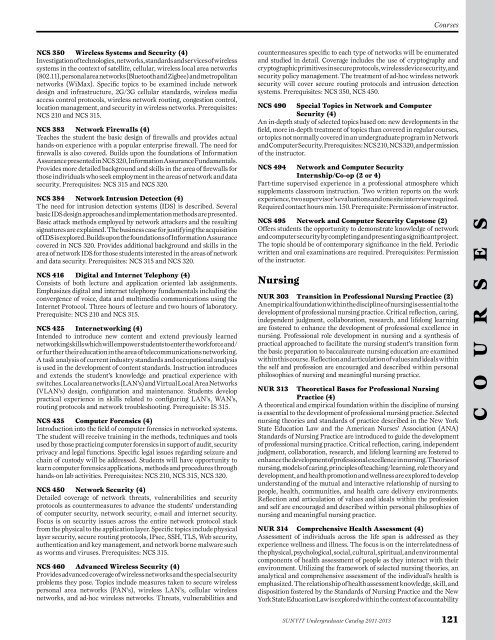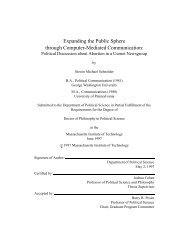Undergraduate Catalog 2011-2013 - SUNY Institute of Technology
Undergraduate Catalog 2011-2013 - SUNY Institute of Technology
Undergraduate Catalog 2011-2013 - SUNY Institute of Technology
Create successful ePaper yourself
Turn your PDF publications into a flip-book with our unique Google optimized e-Paper software.
Courses<br />
NCS 350 Wireless Systems and Security (4)<br />
Investigation <strong>of</strong> technologies, networks, standards and services <strong>of</strong> wireless<br />
systems in the context <strong>of</strong> satellite, cellular, wireless local area networks<br />
(802.11), personal area networks (Bluetooth and Zigbee) and metropolitan<br />
networks (WiMax). Specific topics to be examined include network<br />
design and infrastructure, 2G/3G cellular standards, wireless media<br />
access control protocols, wireless network routing, congestion control,<br />
location management, and security in wireless networks. Prerequisites:<br />
NCS 210 and NCS 315.<br />
NCS 383 Network Firewalls (4)<br />
Teaches the student the basic design <strong>of</strong> firewalls and provides actual<br />
hands-on experience with a popular enterprise firewall. The need for<br />
firewalls is also covered. Builds upon the foundations <strong>of</strong> Information<br />
Assurance presented in NCS 320, Information Assurance Fundamentals.<br />
Provides more detailed background and skills in the area <strong>of</strong> firewalls for<br />
those individuals who seek employment in the areas <strong>of</strong> network and data<br />
security. Prerequisites: NCS 315 and NCS 320.<br />
NCS 384 Network Intrusion Detection (4)<br />
The need for intrusion detection systems (IDS) is described. Several<br />
basic IDS design approaches and implementation methods are presented.<br />
Basic attack methods employed by network attackers and the resulting<br />
signatures are explained. The business case for justifying the acquisition<br />
<strong>of</strong> IDS is explored. Builds upon the foundations <strong>of</strong> Information Assurance<br />
covered in NCS 320. Provides additional background and skills in the<br />
area <strong>of</strong> network IDS for those students interested in the areas <strong>of</strong> network<br />
and data security. Prerequisites: NCS 315 and NCS 320.<br />
NCS 416 Digital and Internet Telephony (4)<br />
Consists <strong>of</strong> both lecture and application oriented lab assignments.<br />
Emphasizes digital and internet telephony fundamentals including the<br />
convergence <strong>of</strong> voice, data and multimedia communications using the<br />
Internet Protocol. Three hours <strong>of</strong> lecture and two hours <strong>of</strong> laboratory.<br />
Prerequisite: NCS 210 and NCS 315.<br />
NCS 425 Internetworking (4)<br />
Intended to introduce new content and extend previously learned<br />
networking skills which will empower students to enter the workforce and/<br />
or further their education in the area <strong>of</strong> telecommunications networking.<br />
A task analysis <strong>of</strong> current industry standards and occupational analysis<br />
is used in the development <strong>of</strong> content standards. Instruction introduces<br />
and extends the student’s knowledge and practical experience with<br />
switches. Local area networks (LAN’s) and Virtual Local Area Networks<br />
(VLAN’s) design, configuration and maintenance. Students develop<br />
practical experience in skills related to configuring LAN’s, WAN’s,<br />
routing protocols and network troubleshooting. Prerequisite: IS 315.<br />
NCS 435 Computer Forensics (4)<br />
Introduction into the field <strong>of</strong> computer forensics in networked systems.<br />
The student will receive training in the methods, techniques and tools<br />
used by those practicing computer forensics in support <strong>of</strong> audit, security<br />
privacy and legal functions. Specific legal issues regarding seizure and<br />
chain <strong>of</strong> custody will be addressed. Students will have opportunity to<br />
learn computer forensics applications, methods and procedures through<br />
hands-on lab activities. Prerequisites: NCS 210, NCS 315, NCS 320.<br />
NCS 450 Network Security (4)<br />
Detailed coverage <strong>of</strong> network threats, vulnerabilities and security<br />
protocols as countermeasures to advance the students’ understanding<br />
<strong>of</strong> computer security, network security, e-mail and internet security.<br />
Focus is on security issues across the entire network protocol stack<br />
from the physical to the application layer. Specific topics include physical<br />
layer security, secure routing protocols, IPsec, SSH, TLS, Web security,<br />
authentication and key management, and network borne malware such<br />
as worms and viruses. Prerequisites: NCS 315.<br />
NCS 460 Advanced Wireless Security (4)<br />
Provides advanced coverage <strong>of</strong> wireless networks and the special security<br />
problems they pose. Topics include measures taken to secure wireless<br />
personal area networks (PAN’s), wireless LAN’s, cellular wireless<br />
networks, and ad-hoc wireless networks. Threats, vulnerabilities and<br />
countermeasures specific to each type <strong>of</strong> networks will be enumerated<br />
and studied in detail. Coverage includes the use <strong>of</strong> cryptography and<br />
cryptographic primitives in secure protocols, wireless device security, and<br />
security policy management. The treatment <strong>of</strong> ad-hoc wireless network<br />
security will cover secure routing protocols and intrusion detection<br />
systems. Prerequisites: NCS 350, NCS 450.<br />
NCS 490 Special Topics in Network and Computer<br />
Security (4)<br />
An in-depth study <strong>of</strong> selected topics based on: new developments in the<br />
field, more in-depth treatment <strong>of</strong> topics than covered in regular courses,<br />
or topics not normally covered in an undergraduate program in Network<br />
and Computer Security. Prerequisites: NCS 210, NCS 320, and permission<br />
<strong>of</strong> the instructor.<br />
NCS 494 Network and Computer Security<br />
Internship/Co‐op (2 or 4)<br />
Part‐time supervised experience in a pr<strong>of</strong>essional atmosphere which<br />
supplements classroom instruction. Two written reports on the work<br />
experience, two supervisor’s evaluations and one site interview required.<br />
Required contact hours min. 150. Prerequisite: Permission <strong>of</strong> instructor.<br />
NCS 495 Network and Computer Security Capstone (2)<br />
Offers students the opportunity to demonstrate knowledge <strong>of</strong> network<br />
and computer security by completing and presenting a significant project.<br />
The topic should be <strong>of</strong> contemporary significance in the field. Periodic<br />
written and oral examinations are required. Prerequisites: Permission<br />
<strong>of</strong> the instructor.<br />
Nursing<br />
NUR 303 Transition in Pr<strong>of</strong>essional Nursing Practice (2)<br />
An empirical foundation within the discipline <strong>of</strong> nursing is essential to the<br />
development <strong>of</strong> pr<strong>of</strong>essional nursing practice. Critical reflection, caring,<br />
independent judgment, collaboration, research, and lifelong learning<br />
are fostered to enhance the development <strong>of</strong> pr<strong>of</strong>essional excellence in<br />
nursing. Pr<strong>of</strong>essional role development in nursing and a synthesis <strong>of</strong><br />
practical approached to facilitate the nursing student’s transition form<br />
the basic preparation to baccalaureate nursing education are examined<br />
within this course. Reflection and articulation <strong>of</strong> values and ideals within<br />
the self and pr<strong>of</strong>ession are encouraged and described within personal<br />
philosophies <strong>of</strong> nursing and meaningful nursing practice.<br />
NUR 313 Theoretical Bases for Pr<strong>of</strong>essional Nursing<br />
Practice (4)<br />
A theoretical and empirical foundation within the discipline <strong>of</strong> nursing<br />
is essential to the development <strong>of</strong> pr<strong>of</strong>essional nursing practice. Selected<br />
nursing theories and standards <strong>of</strong> practice described in the New York<br />
State Education Law and the American Nurses’ Association (ANA)<br />
Standards <strong>of</strong> Nursing Practice are introduced to guide the development<br />
<strong>of</strong> pr<strong>of</strong>essional nursing practice. Critical reflection, caring, independent<br />
judgment, collaboration, research, and lifelong learning are fostered to<br />
enhance the development <strong>of</strong> pr<strong>of</strong>essional excellence in nursing. Theories <strong>of</strong><br />
nursing, models <strong>of</strong> caring, principles <strong>of</strong> teaching/learning, role theory and<br />
development, and health promotion and wellness are explored to develop<br />
understanding <strong>of</strong> the mutual and interactive relationship <strong>of</strong> nursing to<br />
people, health, communities, and health care delivery environments.<br />
Reflection and articulation <strong>of</strong> values and ideals within the pr<strong>of</strong>ession<br />
and self are encouraged and described within personal philosophies <strong>of</strong><br />
nursing and meaningful nursing practice.<br />
NUR 314 Comprehensive Health Assessment (4)<br />
Assessment <strong>of</strong> individuals across the life span is addressed as they<br />
experience wellness and illness. The focus is on the interrelatedness <strong>of</strong><br />
the physical, psychological, social, cultural, spiritual, and environmental<br />
components <strong>of</strong> health assessment <strong>of</strong> people as they interact with their<br />
environment. Utilizing the framework <strong>of</strong> selected nursing theories, an<br />
analytical and comprehensive assessment <strong>of</strong> the individual’s health is<br />
emphasized. The relationship <strong>of</strong> health assessment knowledge, skill, and<br />
disposition fostered by the Standards <strong>of</strong> Nursing Practice and the New<br />
York State Education Law is explored within the context <strong>of</strong> accountability<br />
C O U R S E S<br />
<strong>SUNY</strong>IT <strong>Undergraduate</strong> <strong>Catalog</strong> <strong>2011</strong>-<strong>2013</strong> 121
















